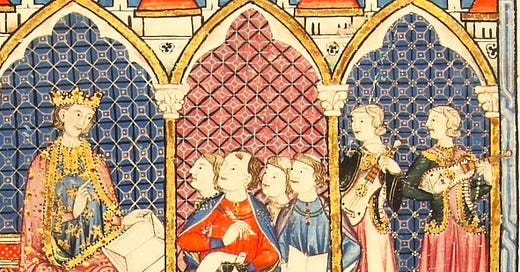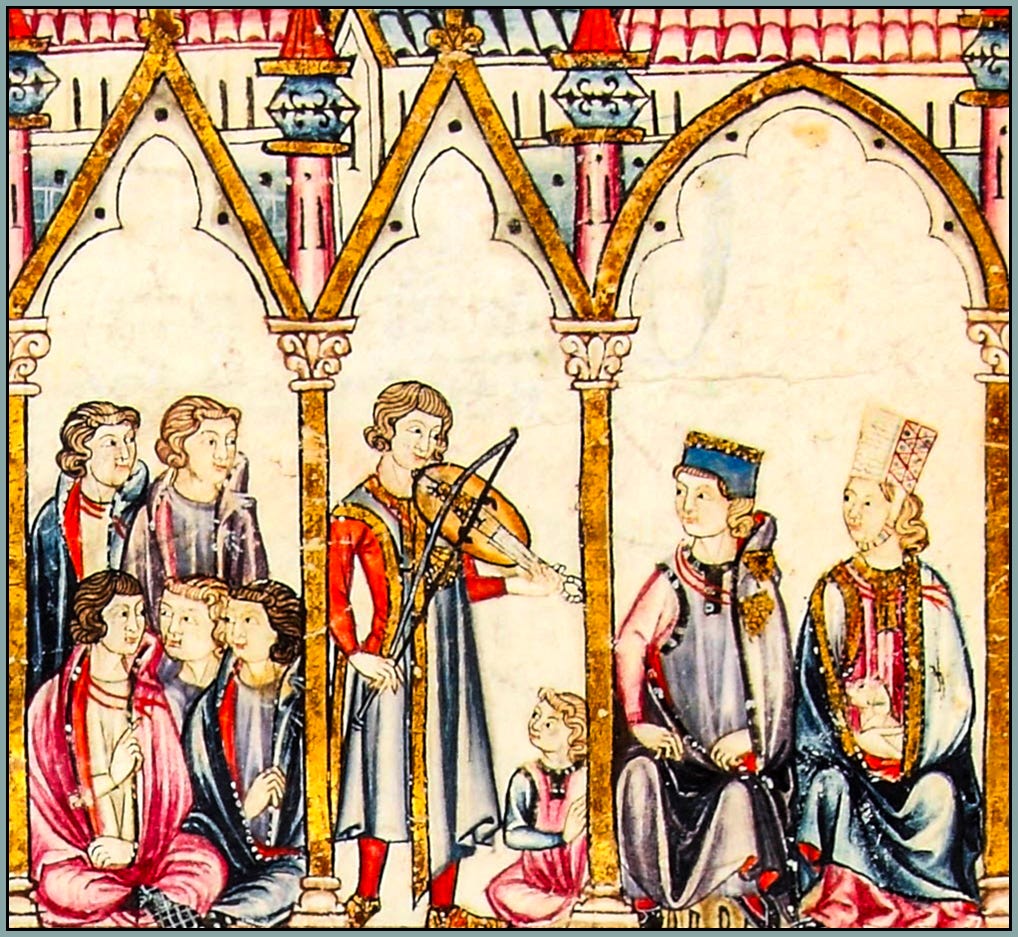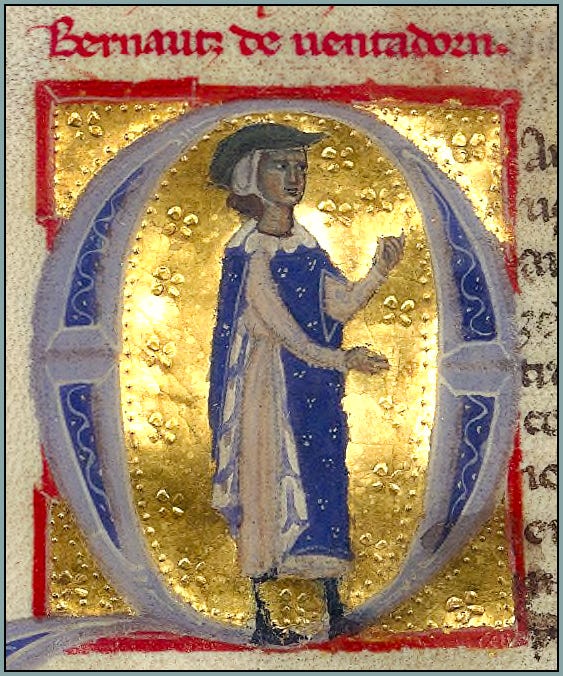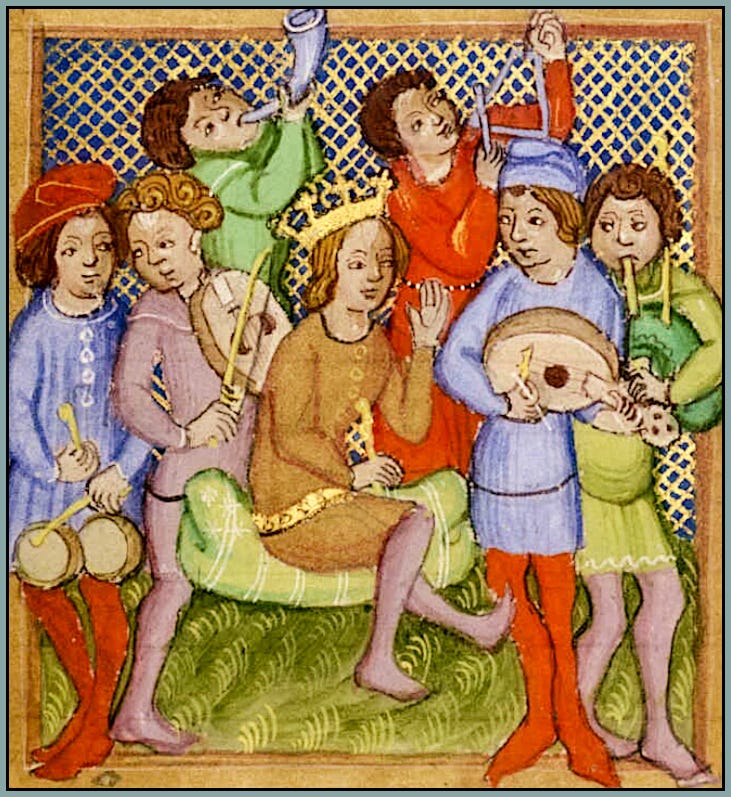Celebrating the Easter Season with Shakespeare’s “Festive Comedy”
A practical suggestion for Easter joy
Last Sunday’s post, entitled “Modern Celebrations of Easter Are Woefully Inadequate,” was 1,762 words in length. That ended up being rather short compared to the comments on the article, which currently have a combined length of 4,631 words. We have much to say, it would seem, about joy, and about its devastating scarcity in postmodern life. We have much to say about spiritual gladness and godly leisure and authentic festivity, and about the traditions—both sacred and secular—that are the lifeblood of these things. Drain this lifeblood from celebration and fellowship, as the modern West seems strangely willing to do, and what remains, if not quite dead, will be hardly fit to look upon. Replace this lifeblood with a monstrous surrogate, something along the lines of what Victor Frankenstein contrived in his laboratory, and we will be closer to what Lodovico utters in the final speech of Othello: “The object poisons sight. Let it be hid.”
What is joy, and whence does it come? How do we find it, feel it, hold it, live it? These questions, in which so much of human civilization resides, are far too heavy to depend safely from the flighty pixels of a Substack post. Even the sheepskin parchment of a medieval manuscript struggles to sustain them. I will, however, ask this post to bear the weight of one element in the mystery of joy. Though not the whole story, it is fundamental, and perhaps more importantly, it is available to us modern folks in a way that other elements are not.
A distinguished literary scholar named C. L. Barber wrote the book Shakespeare’s Festive Comedy, in which he argues that Shakespeare’s comedic plays are deeply united to the culture of festivity in late medieval and early modern England. In other words, some of the greatest comedies in English literature are essentially festive, giving theatrical expression to the cycle of real-life rejoicing that carried every man, woman, and child in medieval England from January to December, and from youth to adulthood, and from birth to death. The year was a journey through “Candlemas, Shrove Tuesday, Hocktide, May Day, Whitsuntide, Midsummer Eve, Harvest-home, Halloween, and the twelve days of the Christmas season ending with Twelfth Night,” celebrated not only liturgically but also with banquets, morris dances, sword dances, mystery plays, masques, and “a bewildering variety of sports, games, shows, and pageants.” As Barber points out,
“Merry England” was merry chiefly by virtue of its community observances of periodic sports [i.e., entertainments, diverting pastimes] and feast days.
Let’s not pass that statement by too quickly. We live in the era of the modern individualistic self, which has been around for centuries but is rapidly descending to new and disturbing depths through the appification of human relationships and the smartphone-ification (if you will) of human thought. The terminus of such processes is not so much humanity as the conceptual “cyborg” that Donna Haraway theorizes in her famous essay from the 1980s:
Unlike the hopes of Frankenstein’s monster, the cyborg does not expect its father to save it through a restoration of the garden…. The cyborg does not dream of community on the model of the organic family…. The cyborg would not recognize the Garden of Eden; it is not made of mud and cannot dream of returning to dust.
So long as it gets new batteries and a software update from time to time, the cyborg is an independent and self-contained system, powered internally by electrical energies that need not be expressed and cannot be shared. Indeed, the cyborg is
the awful apocalyptic telos of the West’s escalating dominations of abstract individuation, an ultimate self untied at last from all dependency, a man in space.
People everywhere are fighting back, determined to reclaim, in various ways, their humanity. Deo gratias. But the wounds remain: we are not completely immune to the spirit of the age, not wholly impervious to centuries of psychological conditioning. We were born in, and still live in, the age of the radically individual self, and consequently, our tendency is to understand joy as something abstract, emotional, internal—or perhaps even biochemical (Google’s AI bot will gladly tell you about the six neurotransmitters associated with joy). Professor Barber, describing merry pre-modern England, shows us another paradigm, one in which people generated and expressed and experienced joy primarily through physical things and communal events: traditional recreation, ritualistic commemoration, liturgical celebration.
This is certainly not to say that joy was purely physical or exterior. Joy as an emotional sensation goes back, surely, to the very Beginning, when Adam first beheld the lovely bride whom God had fashioned specially for him; indeed, the Bible’s first instance of the verb “rejoice” (Hebrew samakh), in Exodus 4:14, suggests interiority: “when he seeth thee, he will rejoice in his heart.” But I can imagine that for a typical medieval Christian living in the world, joy was not something that welled up unpredictably from the depths of the inner self, like water from an inconstant spring. Rather, it began outside the self and from there seeped into the soul, like rain in July that washes drought out of the land and that feverish summer heat out of the mind. There was, consequently, a reassuring substantiality in joy—its principal source was not the ethereal (and notoriously fickle) realm of thought and feeling but the sensible, social, habitual world of worshipping, feasting, singing, dancing, competing, playing, storytelling, reenacting, reuniting. The modern mind has been trained to seek for happiness by looking inward, wandering through the airy regions of the psyche, wondering when that elusive fount of joyfulness will begin to flow again. The medieval mind longed for that divine feeling just as much as we do, but it was less likely to search the labyrinth of the inner self, and more likely to just look at the calendar.
The last few days have been a curious experience, in which my own writing has affected me more strongly than I expected. On Tuesday I shared a stanza from “Can l’erba fresch’ e·lh folha,” a medieval Occitan poem about the beauties and delights of springtime. Two of the lines from my translation kept running through my head:
I have joy in him [the nightingale], joy in the flowers,
joy in myself, great joy in my lady.
The Occitan preposition is de: joi ai de lui, e joi ai de la flor / e joi de me e de midons major. A more literal translation, then, would be “joy from the nightingale,” “joy from the flowers,” etc. Notice how the external sources, those which transcend the interior realm and appeal to the physical senses, are mentioned first; only after deriving joy from the world around him does the poet feel joy coming from his inner self. And though the joy produced by a meaningful personal relationship is mentioned last, this arrangement conveys climax rather than subordination, because his interpersonal joy is identified as the most important of them all: I translated major as “great” for metrical reasons, but it means “greater.”
And now imagine that instead of strolling through medieval springtime, breathing in woodland aromas and gazing fondly at your knight or lady, you are enclosed by the cold walls of a stately English home, and by the bleak chill of an English winter. You don’t have the nightingales or the cheerful flowers, but you do have a poet: the Provençal troubadour who composed the lines above, Bernart de Ventadorn, visited England in the 1150s. You have joy from his words, joy from his music, joy from your friends who have gathered in the great hall to hear him—and finally, joy from yourself.
Odysseus, man of many wiles, replied:
“Alcínoüs, the king all men revere,
it surely is a pleasant thing to hear
a singer like Demódocus, a man
whose voice is like the gods’. I say we reach
the deepest of delights when, at a feast,
beside the tables heaped with bread and meat,
men, seated in due order, fill the hall
and listen to a harper: joy takes all,
and the cupbearer draws wine from the bowl
and brings it round and brims the cups: my soul
finds nothing on this earth more beautiful.”
—The Odyssey, Book IX (transl. Mandelbaum)
You’re not likely to find a bard like Demódocus these days. But we’ll make the best of what we have, and what we have are books, computers, and Shakespeare.
I said earlier in this essay that I would discuss an element of joy that is available to people living in the twenty-first century. At this point the statement might look like a questionable one, because all these village dances and communal feasts and robustly traditional celebrations are precisely what most of us do not have, and cannot have, and are largely powerless to create or even clearly imagine—so thoroughly marginalized and dismantled and memory-holed have they been by modern ideologies and lifestyles. The immensity of this tragedy cannot be captured in words, and we must labor boldly to restore authentic Christian culture in whatever little ways we can. But we must also labor to be vibrantly joyful in its absence—for largely absent it will surely be, during many long years to come.
Let us return, then, to Professor Barber and Shakespeare’s Festive Comedy. The comedy is an ancient literary genre characterized by amusement and happy endings. The word “comedy” understandably carries some stigma nowadays, because the film industry has defiled it with barbaric and idiotic productions that will sacrifice just about anything (except profit) on the altar of laughter. However, this should not lead us into the misconception that comedy is only about happy endings. Dante called his magnum opus La Commedia because it ends happily but also because it was written in the “low” style of a vernacular language, and comedies throughout history have combined happy endings with satire, light entertainment, and laughter.
I admit that comedy is not my favorite type of literature. I have very limited tolerance for satire, and I much prefer smiling to laughing. And that’s one reason why I heartily agree with those who think that some of the best comedies ever written come from the pen of William Shakespeare—like no one else before or since, he produced comedy that was not just satire or humor but a celebration of human life, in all its complexity, richness, depth, and redemptive happiness. Barber’s scholarship helps us understand why this is the case: Shakespeare’s comedic plays are animated and informed, in a special way, by the joy of religious and sociocultural festivity. Furthermore, they give us modern folks an equally special opportunity to partake in this preeminent source and expression of medieval joy.
To some extent, they even encourage us to recapture a few particles of the joyous celebrations themselves, because Shakespeare’s plays were meant to be publicly performed, not privately read. Every one of his comedies is the seed of a real-life event in which human beings gather to declare, through the best dramatic poetry ever written, “This is a day that the Lord has made: let us rejoice and be glad in it.”
The best place to read Shakespearean comedy is in a sixteenth-century theater, but you probably don’t have access to one of those. If you have a few intrepid friends (or children) with a penchant for blank verse and old-fashioned recreation, maybe you could invite them to a reading party. If not, this is a time when technology provides a helpful substitute: read the play yourself, but listen to a high-quality dramatic recording while you read. A good recording for every Shakespeare play is available on YouTube. Among his best comedies are Much Ado About Nothing, A Midsummer Night’s Dream, and The Winter’s Tale. However, if I had to recommend just one play for Easter reading, it would be Pericles, a heartwarming (and notably medieval) masterpiece that will be our topic of discussion on Tuesday.













Robert, I think you are one of the best writers I've read in a very long time. Indeed, we have lost so much of the joys of the calendar that my parish doesn't offer an evening Mass for the days of Hocktide (a term I first read here and had to Google it's meaning) for some reason. Due to the secular world's obsession with getting everyone back to work ASAP, I feel that if one cannot get out of work for these important days that Mass should at least be offered in the evening so at least some trite celebration can be offered.
As an aside, we had a tea party last Sunday after Mass and the parish courtyard was filled with merrymaking and fellowship: true joy.
I really enjoyed this essay! I especially love that you brought out Shakespeare's unique contribution to comedy-- one in which he both continued and elevated the form. Northrop Frye, another renowned Shakespeare scholar (and direct student of C.S. Lewis) said that comedy (as a form), ultimately shows the arc of community coming together, and that all the comedies are about community activities (so that is why we will see most of Shakespeare's comedies ending with weddings, double weddings, dances, feasting, etc); the happy ending is the repair and rebuilding of the community, the repair of that original rupture of community in Eden. (I will also add that in a smaller scale way, I have found that P. G. Wodehouse is very much in this comedic vein, though obviously in a much lighter key!). I heartily endorse your recommendations for a starting place in comedy, particularly Much Ado (I just don't think any of his comedies top it!), and I *loved* Pericles, so I am looking forward to your article on that one.